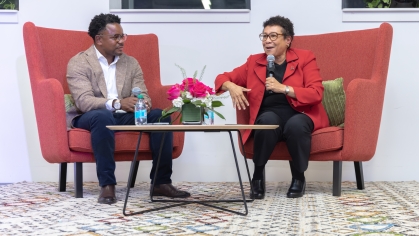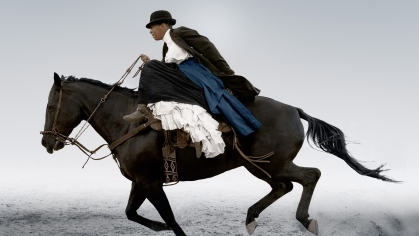Humanities Action Lab Awarded Mellon Grant for Mass Incarceration and Climate Projects

The Mellon Foundation recently awarded the ExternalHumanities Action Lab (HAL), based at Rutgers University–Newark, a $1.1 million grant to expand and integrate two of its signature projects, ExternalStates of Incarceration: A National Dialogue of Local Histories and ExternalClimates of Inequality: Stories of Environmental Justice.
The grant represents a significant expansion in the Foundation’s support and enables HAL to continue its public-history efforts on mass incarceration and climate change in the U.S., driven by frontline communities who are disproportionately impacted by both. It also provides HAL with funds to bring the coalitions it has around these two projects together, and to develop ways communities can, in partnership with local universities, share histories and memories that support a global “Just Transition,” using knowledge of past injustices to chart a way through the climate crisis that is equitable.
“We are thrilled for the Mellon Foundation's support for university-community partnerships that create new models for how to harness public humanities for a Just Transition,” said HAL Director Liz Ševčenko. “This will help HAL build on frontline communities’ generations of knowledge and experience while connecting local knowledges across the country.”
States of Incarceration launched in April 2016, bringing together more than 800 people in 18 states who together created a traveling exhibit, web platform and series of public dialogues around the carceral state in the U.S. and its impact on their local communities. Climates of Inequality launched as a digital platform and traveling multimedia exhibit in Newark, NJ, in October 2019, created by a coalition of students, educators and community leaders in 22 cities across the U.S. and around the world to address environmental issues affecting various communities, their historical roots, and strategies to transition from extractive environments to generative ones.
By connecting these two projects under the Just Transition framework with the help of this new Mellon Foundation grant, HAL will be able to better deploy its resources, foster deeper understanding and engagement in the interrelated nature of the issues, and better connect the assets and knowledge of HAL’s coalition of faculty, students and community and university organizers across more than 30 cities who are working on these pressing issues.
HAL’s next phase of work will recognize that environmental racism and mass incarceration share historical roots in white supremacy, and that lower-income communities of color often experience both in intertwined ways and have common strategies for eradicating them. It will enable HAL's community partners to highlight more complete and accurate narratives around the historical harms and ongoing legacies of these two issues and help them engage diverse publics in dozens of cities across the country to envision and build a more just future.
.
In the process, HAL’s community and university partners will develop specific public-history methodologies for a Just Transition, including rapid-response story-sharing in support of immediate mutual aid during climate-related crises or cases of police violence; jumpstart campaigns for reparation to redress historical inequities and reshape the carceral state and climate; and build skills and employ new media and storytelling strategies such as cell-phone videos, digital story maps and zines to augment HAL’s large-scale exhibit installations and make these projects even more accessible to frontline community audiences.
“It’s critically important for us in Newark and in communities like ours everywhere to make ever more visible the common, racist underpinnings of inequities that on the surface may appear to be unrelated,” said Rutgers-Newark Chancellor Nancy Cantor. “Disparities in our justice system and in environmental injustice are both rooted in a history of white supremacy, but that may not be obvious even in communities experiencing both. That’s why HAL’s work on supporting storytellers in these frontline communities is an absolutely essential element of repairing persistent racial injustice—and that’s why we’re so deeply grateful to the Andrew W. Mellon Foundation for making this essential work possible.”
Students, faculty and community organization leaders at HAL’s partner campuses will create multimedia public humanities projects around local histories related to HAL’s current themes of mass incarceration and climate justice. They’ll plan, design, update and expand on States of Incarceration and Climates of Incarceration collective projects—including courses, collective multi-media traveling exhibition, and web platforms—amplifying the narratives and impact of teams’ local projects by connecting them onto shared public platforms. And they’ll build capacity for teams’ local projects through peer-to-peer learning exchanges and a multimodal resource center facilitated by HAL Hub staff, which will support work across these thematic projects and potential future ones.
“As climate disasters come harder and more often, and the slow violence of the carceral state and environmental degradation get more severe, frontline communities across the HAL network have created new strategies for mutual aid and resistance that connect people through memory and stories,” said Ševčenko. “To achieve a Just Transition into a more equitable world, we need to understand and address past harms, and this creates both an obligation and an opportunity for public historians and organizations like HAL.”
About Humanities Action Lab (HAL)
The ExternalHumanities Action Lab (HAL) is a coalition of universities, issue organizations, and exhibiting spaces in more than 40 cities, led from Rutgers University–Newark, that collaborates to produce community-curated public projects on urgent social issues. Through courses offered simultaneously across multiple campuses, local teams of students and stakeholders explore a single issue of shared concern from different local perspectives, exploring the deep roots, long legacies, and potential futures of the issue in their own communities. After a three-to-six-month creation process, involving dialogue and exchange among diverse local participants, teams engage a broader local and international public by producing multimedia local stories that HAL combines into a single collective physical and digital exhibition. This collective public project travels for years to museums, public libraries, cultural centers, and other spaces in each of the communities that helped create it, with public dialogues and events at each stop. New campuses and communities join and add local “chapters” along the way. This collaborative process -- engaging more than 1,000 people across more than 20 cities in a common endeavor -- approaches public memory as a social movement, training public humanists as civic leaders and change agents.
About The Andrew W. Mellon Foundation
The Andrew W. Mellon Foundation is the nation’s largest supporter of the arts and humanities. Since 1969, the Foundation has been guided by its core belief that the humanities and arts are essential to human understanding. The Foundation believes that the arts and humanities are where we express our complex humanity, and that everyone deserves the beauty, transcendence, and freedom that can be found there. Through our grants, we seek to build just communities enriched by meaning and empowered by critical thinking, where ideas and imagination can thrive. Learn more at Externalmellon.org.


